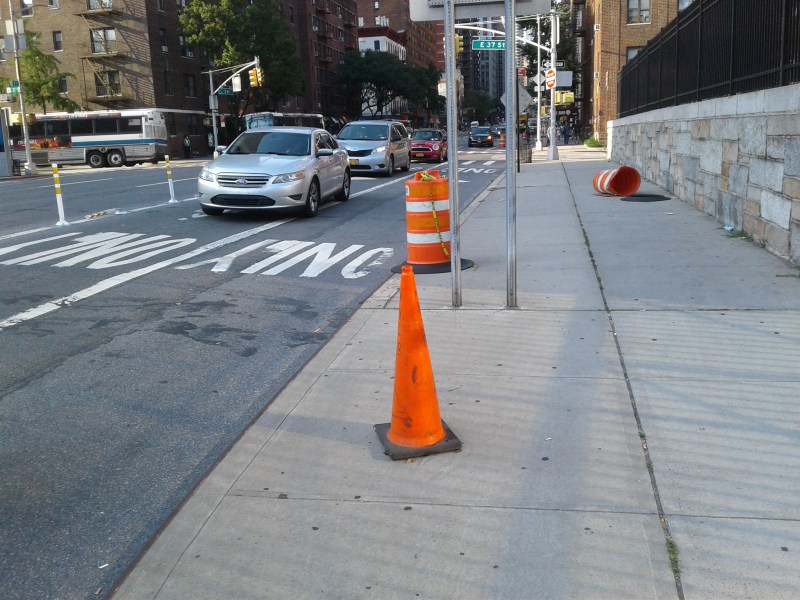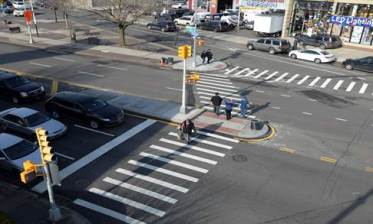Opinion: Why is DOT Commissioner Trottenberg Happy with Half-Measures from a Middling Mayor?

Mayor de Blasio’s deeply ingrained windshield perspective is old news. With an obsession with alternate-side parking bordering on the pathological and a menu of half-measures trumpeted as major initiatives, it’s hard to imagine a scenario where New York avoids carmageddon under his leadership.

But what about the other steward of New York’s streets, DOT Commissioner Polly Trottenberg? Does she want to use her position to reapportion street space as London, Paris, Milan and countless other places around the world have in the past few months? Is she as frustrated as so many New Yorkers are by the mayor’s constant deference to the NYPD? Is she terrified of a city racked by climate change? What is her vision for the future? Or is she satisfied with mere tweaks to the status quo? It’s hard to tell.
In the past, when she has spoken out in favor of bolder action — such as when she vowed to finish the Queens Boulevard bike lane — the mayor has thrown her under the bus. But at other times, independent of the mayor, her rhetoric has suggested a philosophy that can be summed up in one word: “No.”
Trottenberg frequently frames things not merely in terms of what her department cannot do but what New York City cannot be. Echoing the mayor’s frequent claim that “New York is just a different place” than its international counterparts (and is therefore unable to create more space for people instead of cars), she has claimed that New York can’t install hundreds of miles of temporary bike lanes because “we’re much bigger than Paris.” On Thursday, at the CityLaw breakfast, she said that the Greatest City in the World can’t prioritize cycling as London has because, unlike our friends across the pond, we haven’t expanded transit capacity. It’s an excuse that doesn’t explain poor bicycle lane design or a lack of network connectivity in parts of the city, Manhattan especially, that are already well served by transit. For whatever reason, this administration’s interpretation of New York City exceptionalism seems to mean that every other city can get things done except New York.

This focus on “no” is evident even when Trottenberg says something indisputable. Would New York City drivers destroy pop-up bike lanes made of just traffic cones or barrels? They sure would and they sure have. But all that means is that DOT should do more, not throw in the towel and say that better things aren’t possible.
Other times her rhetoric appears to place those who oppose progressive transportation policy as the primary force guiding the department’s planning process. The commissioner often notes that some business owners have strong opinions about bus lanes, but you know who else does, only in a very different way? Bus riders. And there are a lot more of them who would benefit.
Trottenberg is not entirely wrong. Opposition to her department’s work can command outsized attention and, if not addressed or anticipated, derail even the most sensible transportation plan. But rather than leading with and amplifying such complaints, she should use language that keeps a project’s beneficiaries front and center. There’s no reason for the DOT commissioner to explain why some people oppose change; guardians of the status quo always do that job on their own. The opponents of the 14th Streets busway had a litany of reasons for why it wouldn’t work in New York and were able insert their “no way, no how” rhetoric into multiple newscycles. Only once it was launched did the busway’s full benefits to riders come to light, mostly drowning out the complaints.
Beyond this victory, the DOT’s record is so good that it should be the foundation of transformational, rather than incremental change: Traffic fatalities in New York have bucked national trends and, despite some tough years, have trended down overall since 2014. The city has lowered the speed limit, expanded the use of life-saving school-zone speed cameras, and built dozens of miles of protected bike lanes. Such improvements save and improve lives — and Trottenberg gets credit for that.
It is precisely because of this record that a change in framing is long overdue. After all, much of what she has accomplished were once things people said could never happen here. Nowhere is this phenomenon more evident than with the city’s current curbside dining program. Years of rule-bound restrictions and red tape — its own kind of “culture of no” — were undone nearly overnight by the necessity of avoiding economic calamity for small businesses. Now, after mere weeks, a new constituency for better streets has been born, as people who might never have entertained the idea that the curb could be used for anything other than car storage have seen a better way. It’s as clear an example as any of how quickly culture can change when institutions flip the script from “no” to “yes.”
Will New York emerge from its multiple crises as a more functional, sustainable and just city or is it doomed to run out the clock on the de Blasio administration with little to show for it other than a modest amount of bus lanes, a sprinkling of bicycle lanes and a handful of pedestrian safety improvements? Continuing an incrementalist approach and perpetuating a “culture of no” will most surely result in a city choked by cars, wipe out the many gains of Vision Zero, further entrench deep economic disparities and hasten catastrophic climate change. There is obviously only so far Commissioner Trottenberg can go under a mayor who never saw a parking space he didn’t want to save, but does she want to go further? Does she understand that her negative framing validates NIMBYs who also use language like “This isn’t Paris” or “This isn’t London” to oppose DOT bus and bike-lane projects?
The mere act of focusing on what New York can do instead of what it can’t would be one small way to signal that a different future is possible, even if it alone will not take us there. Such a pivot isn’t easy in any big institution, especially when faced with deep budget cuts and an ongoing public health emergency. But this is precisely the moment for a leader to change the culture, embrace “yes” and use it as a guiding principle to unleash the creative spirit that is the true definition of New York City exceptionalism.
Doug Gordon is a Brooklyn-based street safety activist, TV writer and co-host of “The War on Cars” podcast. Follow him on Twitter @brooklynspoke.
